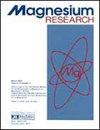Magnesium in the CNS: recent advances and developments.
IF 1.5
4区 医学
Q4 BIOCHEMISTRY & MOLECULAR BIOLOGY
引用次数: 30
Abstract
A potential neuroprotective role for magnesium in neurological disease has been appreciated for almost three decades, yet translation to the clinical arena has proven elusive. Accumulating experimental evidence continues to suggest that magnesium plays a critical role in a number of neurological conditions including headache, stress, alcohol/drug intoxication, acute brain injury, seizures, Parkinson's disease and Alzheimer's disease. Simple administration of a magnesium salt in these conditions has not always been therapeutically successful, with a number of studies showing poor penetration of serum magnesium across the blood brain barrier. Several studies have since demonstrated that using a carrier such as polyethylene glycol can address this, simultaneously reducing the dose of magnesium required to achieve the desired central effects while at the same time attenuating deleterious peripheral effects. Alternatively, administering a more permeable magnesium salt, such as magnesium threonate, is seen as the preferred option in more chronic neurological conditions, with positive results having been achieved in experimental models of Alzheimer's disease. Irrespective of the approach, improved central penetration of a magnesium compound that avoids peripheral side effects of high magnesium dosages is clearly a desirable outcome, and should now be investigated in animal models that accurately mimic the complex human condition.镁在中枢神经系统:最近的进展和发展。
镁在神经系统疾病中的潜在神经保护作用已经被人们认识了近三十年,然而,将其转化为临床领域却被证明是难以捉摸的。越来越多的实验证据继续表明,镁在许多神经系统疾病中发挥着关键作用,包括头痛、压力、酒精/药物中毒、急性脑损伤、癫痫、帕金森病和阿尔茨海默病。在这些情况下,镁盐的简单施用并不总是治疗成功,许多研究表明血清镁穿过血脑屏障的渗透性差。此后的几项研究表明,使用聚乙二醇等载体可以解决这一问题,同时减少实现所需的中心效应所需的镁剂量,同时减弱有害的外围效应。另外,施用渗透性更强的镁盐,如苏酸镁,被视为治疗更慢性神经系统疾病的首选,在阿尔茨海默病的实验模型中取得了积极的结果。无论采用何种方法,改善镁化合物的中心渗透,避免高镁剂量的周围副作用显然是一个理想的结果,现在应该在精确模拟复杂人类状况的动物模型中进行研究。
本文章由计算机程序翻译,如有差异,请以英文原文为准。
求助全文
约1分钟内获得全文
求助全文
来源期刊

Magnesium research
医学-内分泌学与代谢
CiteScore
3.50
自引率
9.40%
发文量
6
审稿时长
>12 weeks
期刊介绍:
Magnesium Research, the official journal of the international Society for the Development of Research on Magnesium (SDRM), has been the benchmark journal on the use of magnesium in biomedicine for more than 30 years.
This quarterly publication provides regular updates on multinational and multidisciplinary research into magnesium, bringing together original experimental and clinical articles, correspondence, Letters to the Editor, comments on latest news, general features, summaries of relevant articles from other journals, and reports and statements from national and international conferences and symposiums.
Indexed in the leading medical databases, Magnesium Research is an essential journal for specialists and general practitioners, for basic and clinical researchers, for practising doctors and academics.
 求助内容:
求助内容: 应助结果提醒方式:
应助结果提醒方式:


